This lawyer fought paralysis to start India’s first online marketplace serving the needs of the disabled
Over a billion people - nearly 15 percent of the world’s population – is disabled. BillionAbles, the first Indian crowd-sourced inclusive online platform, intends to enable them all.

Life wasn’t easy for Sameer Garg. Disabled due to a spinal injury when he was in college, he has been through a long and challenging journey of fighting stigmas and discrimination.
But Sameer, 43, a lawyer and academician by qualification, decided to take the problem head on and launched BillionAbles, India’s first all-inclusive online platform to discover accessible places, products and services for persons with disabilities, special needs and the elderly.
Born and brought up in a family of lawyers in Meerut, Sameer was keen to become a lawyer and enrolled with DN Degree college, Meerut. However, fate had its way. In his first year of college, when Sameer was just 19 years old, he found himself caught in a college riot. In the ensuing confusion, he was stabbed in the spinal cord, which left him paralysed completely.
The incident came as huge shock to Sameer and his family. But gradually, with physiotherapy, exercise and determination, he reached a stage where he could walk with a walking stick. But the experience changed him completely.
“We had no support. Even for an MRI scan or the smallest of needs, we had to travel to Delhi. I realised that there was a need for a platform that provides persons with disabilities the support they need in terms of information, medicines and accessible places,” Sameer says.
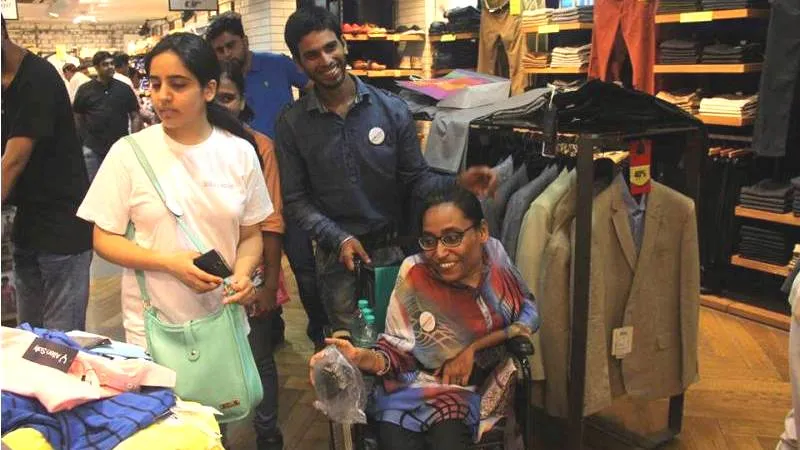
Facing stigma and discrimination
Sameer went on to finish his education; he completed a bachelor’s course in law and a got a post-graduate degree in commerce. He also completed his UGC NET in commerce and became a teacher.
“Over the next 20 years, I taught more than 20,000-25,000students in various universities and colleges,” he says with pride. Sameer also worked as a corporate trainer with companies such as Genpact, ICFAI, ICWAI, etc.
“Despite my experience and hard work, I often faced discrimination of one form or the other. It could be in public places or private gatherings. Whenever I used to go for job interviews, I would normally get shortlisted but never made it. Once they saw me walking with a stick, I was never called again. I applied to more than a 1,000 companies but didn’t make it,” he says.
Sameer recalls an experience while working at a senior position in an e-learning company.
“I got very ill and applied for a month’s leave. I was fired without any notice, information or prior communication,” he says.
This got Sameer thinking. “I wanted to make lives better for people like me. If I was struggling so much for a job or an opportunity, what must be happening with people who were not educated or came from economically less privileged backgrounds? How difficult must life be for persons with disabilities who use wheelchairs, or are visually challenged or hearing impaired? The thought was very disturbing,” Sameer says.
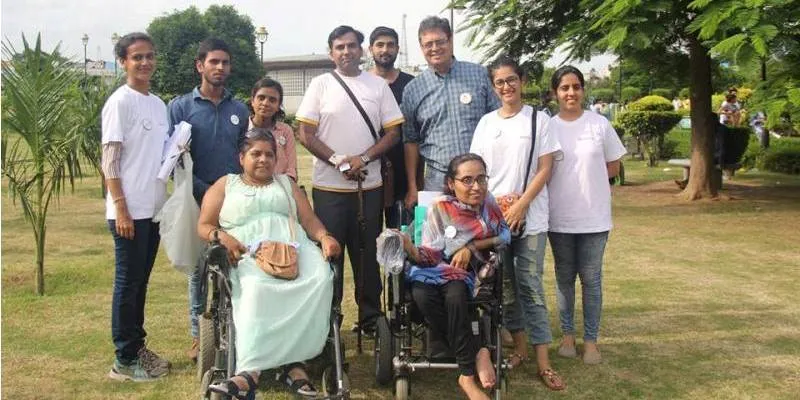
Enabling a billion people
Sameer knew that opportunities and facilities for people with disabilities were scarce, but they did exist. People like him would benefit if all services and information for persons with disabilities were available on a common platform.
“This was the idea. I decided to build a centralised, one-stop platform where all information and services available for persons with disability could be presented and accessed freely. This is when I decided to start BillionAbles,” he says.
The ideation stage began in 2014, but work started only by 2016. Prototypes were built, tried, tested and improvised upon. The platform was finally launched in the year 2017.
“BillionAbles is a for-profit social enterprise as we want it to be a self-sustaining business. We want to build it in such a way that it becomes a social business and motivates other entrepreneurs to enter this field and work for the cause,” he says.
The name BillionAbles indicates the staggering number of people in the world who suffer from one form of disability or the other. Over a billion people, comprising nearly 15 percent of the world’s population, are disabled, indicating the size of the market that needs to be catered to. In India alone, according to census data, 2.21 percent of the population is disabled. WHO says the number is 4 to 5 times more.
“Add to it the elderly population of India, and we have a huge population of nearly 20 crore people in India to cater to,” Sameer says.
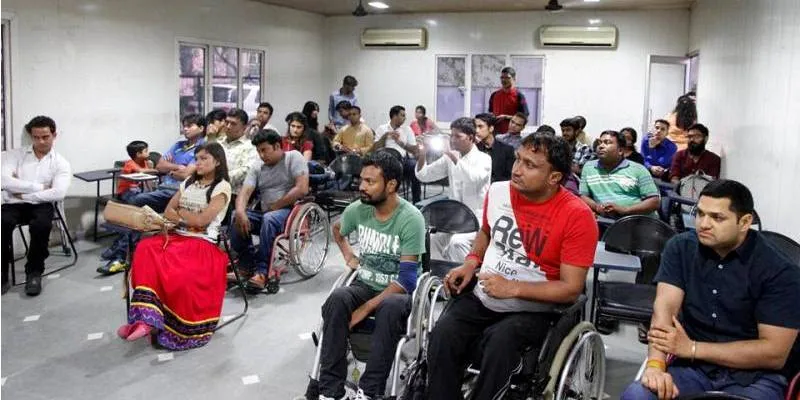
Accessible tools and disabled-friendly trips
Whether it is a disabled-friendly shop, a restaurant with a wheelchair ramp, a café with sign language interpreters, or an educational institute which provides skill-based training to people with disability, BillionAbles provides all relevant information on one platform for users to access freely. One can also find accessible tools, disabled-friendly trips and wheelchair cabs on the platform.
“Any user of BillionAbles app can click pictures of disabled-friendly places, write reviews and submit. We crowd-source the data and our team works to verify them.”
BillionAbles also offers booking options to ensure the tool grows into a sustainable business.
“Anyone who wants to book a restaurant, a disabled-friendly venue or a trip can search for the place on our platform and book it from there directly. Our goal is to become a one-stop market place for persons with disability,” Sameer says.
BillionAbles has also been organising sustainable trips for the disabled. Two such trips have been organised already. In October, a group of 30 people, comprising mainly visually challenged and wheelchair users, went to an amusement and water park in Rohini, Delhi. This was the first time in their life they went on an excursion like this. Some had visited the park earlier but had been sent back as the park authorities didn’t want to “take any risk”.
“There were three visually challenged girls who lived only 500 metres from the amusement park but never visited it. That day they visited the park with their father and enjoyed each and every ride,” Sameer recalls.
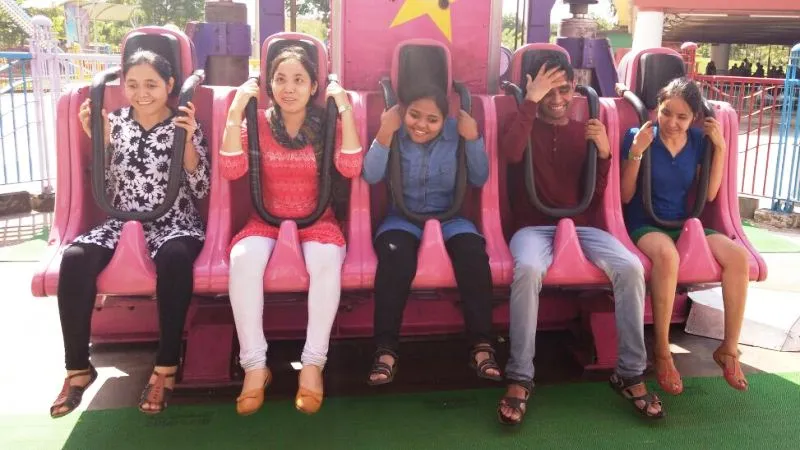
Volunteering for Access Hunt
With over a 1,000 disabled-friendly places in its database, BillionAbles has a working team in Delhi-NCR, Goa, and Rajasthan, where over 300 of the listed accessible places have been duly verified.
“We started the vertical of ‘access hunt’ recently, which is a volunteering event to find, list and verify accessible venues in your locality,” Sameer says.
An event was kicked off in July where students assembled at Central Park in Connaught Place, Delhi. Divided into groups, these volunteers visited shops, venues, cafes and restaurants, among other places, to check if they were disabled-friendly.
“If so, they had to click a picture of the place and upload it on our platform,” Sameer says.
“In three hours, the group of over 100 volunteers listed about 150 places disabled-friendly places in and around Connaught Place. These access hunts are a successful way to educate volunteers and populate our database,” he adds.
BillionAbles is planning a third “access hunt” on December 3, the International Day of Persons with Disabilities.
“This is going to be a virtual event, hosted in Sector 18 market, Noida, where volunteers will be invited from across the country to list disabled-friendly places in their respective towns and cities.”
BillionAbles was selected for FbStart, a program from Facebook designed to help early stage mobile startups. This has entitled them for free credits worth $40,000 from Facebook, along with mentorship and support for the next one year. The social enterprise has also received seed round funding from Pankaj Gupta, Co-CEO of Gulf Islamic Investments.
“We are now going for pre-Series A round of funding,” Sameer adds.
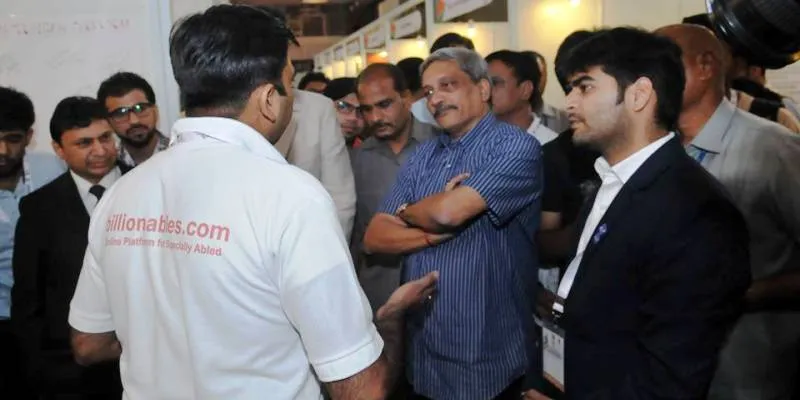
Challenges along the way
When asked about challenges, Sameer remembers his initial days. “Taking the jump was difficult. I had a job. Convincing my family members, convincing my friends, and - most importantly - convincing myself was difficult.”
Since BillionAbles was a bootstrapped venture, Sameer invested all his savings into the venture and took a loan to build the platform.
“2015 was particularly challenging. I don’t have a tech background and had outsourced the project of building the website to a company. That company took off with our project and money. We had to fight a legal case to take back our domain,” he recalls.
Sameer started up again in 2016.
“This was when my Co-founder, Deepak Kumar (24), joined the initiative,” he says.
Deepak is a B-Tech dropout from Kurukshetra University, and is the tech backbone for BillionAbles. With a team of three full-time members, BillionAbles works with freelancers and volunteers for different projects.
“We encourage disabled students from Delhi University colleges to intern with us. Normally they don’t get a chance to do an internship due to mobility restrictions. We provide them with all the training and support needed. Currently, 10 interns are working with us,” he says.
BillionAbles is standing true to its name – enabling the many people with special needs.







